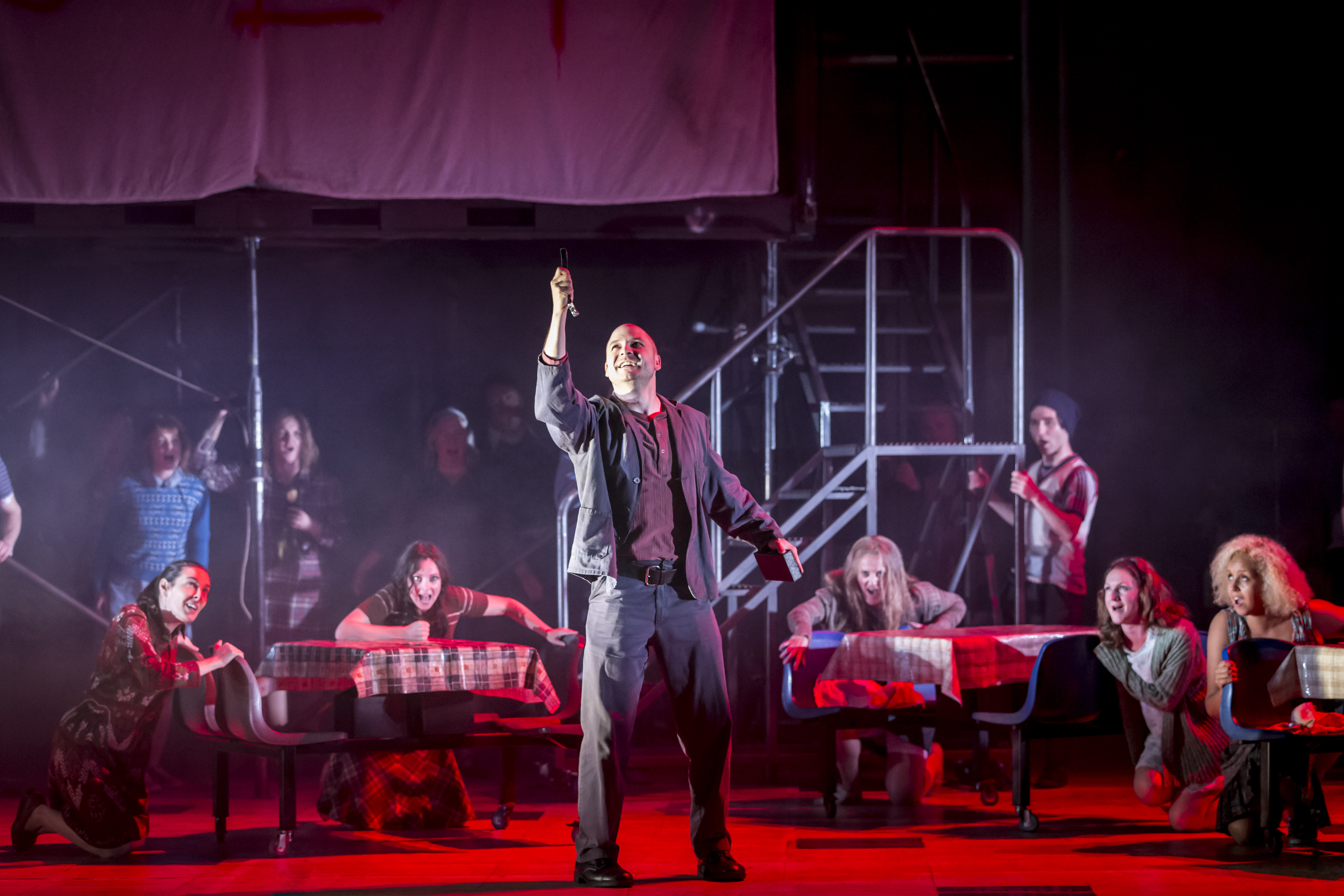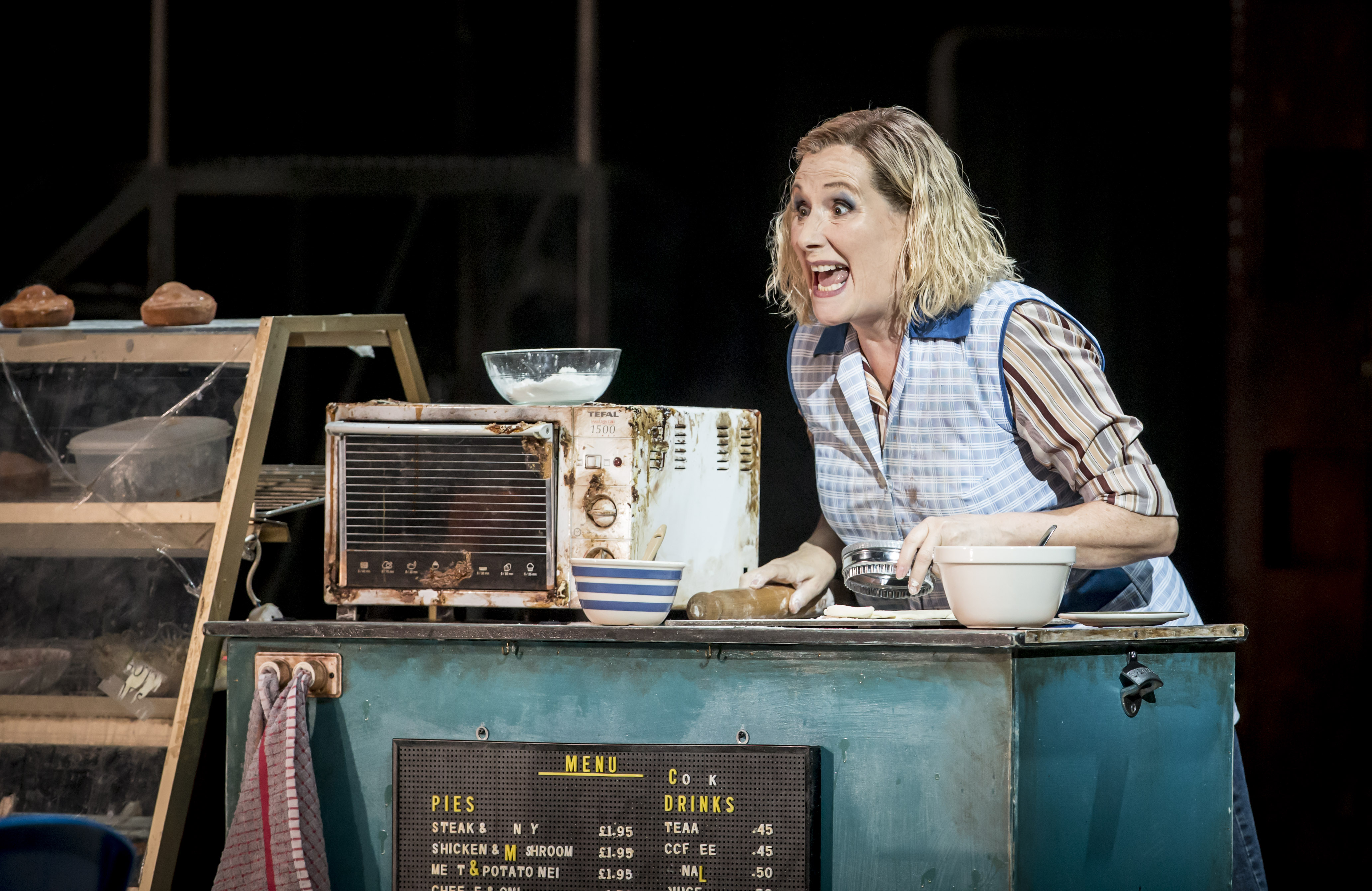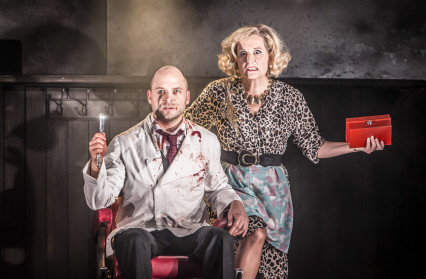Jane Oriel casts a critical eye over the Welsh National Opera’s production of Stephen Sondheim’s Sweeney Todd starring David Arnsperger.
The macabre tale of Sweeney Todd and some particular pies has been a fascination since the 1840s when the story was first serialised in a Penny Dreadful street rag. Even before Stephen Sondheim launched his definitive musical in 1979, I remember seeing posters naming our family doctor in the title role for a local am-dram society, much to the chattering titillation of his patients. With the twin attractions of gore and unwitting cannibalism, the demon barber continues to this day to deliver horror that comes with an added ghoulish satisfaction.
Tonight’s performance, part of the Welsh National Opera’s Madness season, opens in a grey, grim asylum with troubled inmates milling around, staring at a switched-off TV or listlessly playing board games. This new production opens nominally in the year of the musical’s debut, and the shift in era from its usual, newly industrialised, overcrowded and impoverished London of the 19th century to something more contemporary seems like an exciting proposition, especially as 1979 also announced the arrival of Prime Minister Margaret Thatcher. As the 1980s bloomed into the ‘Me’ decade, with yuppies, an explosion in consumer credit and the coining of the term ‘cardboard city’ as homelessness became front page news, parallels and parables shared by the two eras, as well as our own right now, makes this time-shift a thoughtful prospect. As the asylum chorus rises up in shrill strength, admonishing us to ‘Attend the Tale of Sweeney Todd’, the nerve-shredding force of the many voices, hurled heavenwards by the viscous slashing of the orchestra, has us pinned back in our seats from the very start.

The tale in question is of a wrongly punished barber who seeks revenge on a judge who raped his wife, plunging her into mental oblivion before homing Todd’s daughter, planning to wed her when she is of age. For a disturbed man with a set of cut throat razors as his only friends, things will get very messy, but fortunately for him, the down-on-her-luck business woman, Mrs Lovett, is on hand to embrace the opportunity and clean up the blood and guts in the most practical of ways.
A musical that many argue is an opera or vice versa, is staged here by an opera company with a cast of soloists drawn from both disciplines. Taking the titular role, the German, David Arnsperger, who has previously sung The Phantom of the Opera, has a powerful, brooding presence which is apparent from his arrival dockside, and deepens further as he teeters closer and closer to the edge of sanity in the unfolding story.
In a similar fashion to the Royal Opera’s staging earlier this year of Brecht and Weill’s The Rise and Fall of the City of Mahagonny, the multi-use potential of shipping containers has been realised. Employed as an upstairs barber shop, a bedroom, a parlour, a cookhouse, these metal boxes also carry the plus of having their frontages raised or dropped according to scene change. The staging throughout is quite minimal but one wonders if this is more an economic consideration than stylistic, as an obvious spin-off to setting this production in the recent past is the relative ease of prop and costume acquisition. Even with these broadly modern effects, there seems very little to suggest definitively the close years either side of 1980. The dialogue remains of the 19th century, with Todd having been deported to Australia, and the price of haircuts and pies are expressed in the low pennies. So, apart from a street wretch sat wrapped in a blanket, or the latterly prosperous Mrs Lovett wearing a Thatcher hair-do and ‘80s silver lame in her later extravagance, disappointingly, almost nothing is made of the potential for sharp and contemporary social comment, visual or otherwise.

Of the set pieces, the song ‘A Little Priest’ appears as the pie plan is hatching and Mrs Lovett, played ebulliently by Janis Kelly, sings to Sweeney about the vocational taste variations of her meaty ingredients. This turns into an excitable romp with the pair getting quite worked up about matters. Fizzy pop sprays from shaken cans, pies are hurled at each other with glee before the couple head for the bedroom at Act One curtain down. It’s a unique reading of this scene and one I feel worked incredibly well.
Of the other characters, Tobias Ragg, a young apprentice played by George Ure, was very impressive in all the moods and emotions asked of him. His voice delivered precisely what was needed and when. Sondheim wrote Todd’s daughter, Johanna, as merely a cypher of male expectation and desire. She’s a complete airhead ideal of former times and as such, is a difficult character for any performer to get much out of. Even her young man suitor, Anthony, sings of his desire to steal her as though a possession, and both her father and the Judge praise her qualities as an entertainment or adornment. The same two-dimensionality applies to the role of Lucy, the deranged street dweller living off her diminishing charms who is also Todd’s as yet unrecognised wife. Hers is also a characterisation that gives short shrift to anyone playing the role. As rounded female representation goes, Mrs Lovett comes closest and would have been the hero of the piece for her resourcefulness had not her love for Todd ultimately been the reason she ends up baked in her own oven.
As the performance nears its climax, and Todd’s frenzy brings diminishing returns in slashed throat after slashed throat, the music has taken us as far as it can with its astonishing, although often revisited musical themes. The judge is trapped and killed, then Todd realises he’s just killed his own wife by mistake, young Toby loses the plot and Mrs Lovett is thrown into the oven before Todd dies at the crazed hand of Toby: there was just nowhere else to go. We had the rarely performed complete version tonight that’s some twenty minutes longer than the norm. Played to opera lovers, the length itself is not an issue but the crash bang culmination lost power with each denouement, unfortunately leaving the very last pie with a sunken crust. Tonight was a phenomenal event stacked high with treats, but could have been made that little bit tastier with a tighter finale.
Welsh National Opera, Wales Millennium Centre, Cardiff, 9 Oct 2015
Music and lyrics by Stephen Sondheim
Conductor: James Holmes / Director: James Brining / Designer: Colin Richmond / Lighting: Chris Davey
Cast includes: David Arnsperger / Janis Kelly / Jamie Muscato / Soraya Mafi / Steven Page / George Ure / Aled Hall / Charlotte Page / Paul Charles Clarke / members of the WNO Chorus
On tour nationally from 15th October, returning to Wales Millennium Centre 24th – 29th November. For further details https://www.wno.org.uk/
Header photo credit Johan Persson.
Jane Oriel is a regular contributor to Wales Arts Review.











